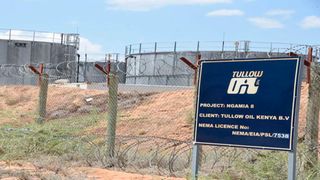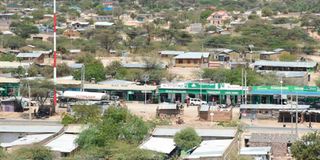
Tullow Oil facility at Ngamia 8 in Lokichar, Turkana County, on February 18, 2020.
| File | Nation Media GroupTurkana
Premium
Govt scrambles to save 820km Lokichar-Lamu crude oil pipeline
The government is scrambling to reassure residents of Turkana County of a fair and participatory land acquisition process, which is key for the completion of a planned 820km crude oil pipeline from Lokichar to Lamu.
The project is part of the Lamu Port-South Sudan-Ethiopia-Transport (Lapsset) corridor project.
Officials from the Ministry of Petroleum and Mining, Ministry of Lands, and the National Land Commission (NLC) said that all the affected locals will be fully compensated.
NLC Turkana County Coordinator James Long'ole told residents that no landowners have been identified.
“There has been a widespread falsehood that … we already have 516 landowners. The 516 is the number of coordinates within the three gazetted oilfields. Amosing has 180 coordinates, Twiga has 106, and Ngamia has 230. The process of identifying project-affected persons had not yet commenced,” Mr Long'ole said last week.
The process of acquiring the land, he said, could start in a week during inspection and survey that will involve technical personnel from various government agencies like the ministries of Lands and Petroleum, Lapsset and NLC.
“The survey team will identify the project-affected persons and the improvement on the land. Compensation will be directly paid to affected communities while for the unregistered land the benefits will go directly to the county government according to the law, unless other negotiations emerge,” Mr Long'ole added.

An aerial view of Lokichar. NLC Turkana County Coordinator James Long'ole told residents that no landowners have been identified.
Mr El Samma Ndegwa, an official with the Ministry of Petroleum and Mining, said once the land is acquired, work will start on the oil pipeline from Lokichar to Lamu that is a key component of the Sh2.5 trillion Lapsset project that Kenya is banking on to enter the commercialisation phase of crude oil production.
“We completed the Early Oil Pilot Scheme phase, where we were transporting 2,000 barrels per day by road from Turkana to Mombasa. We now need a pipeline for us to transport 130,000 barrels per day (and) fully benefit from the crude oil,” Mr Ndegwa said.
Tarmac roads
He noted that officials had identified the Turkwel dam as a critical source of water and 17,000 barrels of water will be used to pump the crude oil per day.
He added that counties within the Lapsset corridor will also benefit from tarmac roads that will open more business opportunities for locals.
Salim Bunu, Lamu Lapsset regional manager, said that the benefits of the project can already be seen.
“Through the Lapsset, Lamu has witnessed visible transformation because we didn't have even a kilometre of tarmacked road. We now have a tarmac road that has boosted the transport sector. We used to take four hours from Lamu to Malindi and now it is two hours,” he said.
Abduba Nangele, another Lapsset official from Isiolo, said that the county now has the Isiolo International Airport and the tarmacked Isiolo-Moyale road.
“We used to take three days to travel from Isiolo to Moyale and during the rainy season one could take a week, but now it is only six hours because locals embraced the project,” Mr Nangele said.
Ms Truphosa Achar, team leader for the Working Group on Implementation of Community Land Act, 2016, said that they are fast-tracking the process of land registration to hasten the compensation process for the affected locals.
Ms Achar said that during public sensitisation on land acquisition, locals demonstrated their willingness to have their land registered so that they are issued with title deeds.




